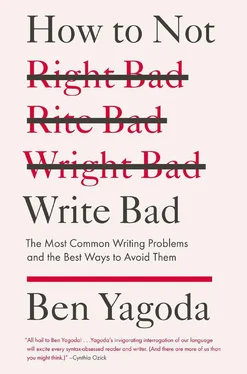Four-syllable: 2 percent
Five-syllable: 0
Six-syllable: 1 percent
Seven-syllable or above: 0
And here, for the fun of it, is a pie chart showing the proportion of words, by length, in the passage:

White’s proportions seem about right as a model for us all, with the understanding that there will be a little give and take in view of your own personal style and the kind of writing you’re doing. Note, by the way, the three long words he used in this 128-word passage: imperative, predicament , and conspiratorial . They are eminently fine words, not replaceable by anything shorter, and a model for when it’s okay to go long.
3. PRECISION: WORDS THAT ARE A BIT OFF
The online thesaurus is a great tool. The online thesaurus is a menace.
Let me expand on that thought. Three sentences ago, I used the word tool. If I for some reason weren’t happy with it and consulted the thesaurus provided by Microsoft Word, I would be offered the following alternatives: instrument, apparatus, implement, device, means, utensil, contrivance , and gizmo. I submit that none of these would be an acceptable substitute for tool in that sentence, with the possible exceptions of device (barely) and gizmo (not bad). However, if I were someone who hadn’t read a lot, and especially if I were someone who thought that longer is better, I might be tempted by instrument, apparatus, utensil, and maybe even some others. If I gave in to temptation, I would wreck the sentence.
The thesaurus is helpful and cool if you have a strong sense of the meaning and nuance of words, and/or if you are willing and able to use the dictionary as well: that is, if you can handle the goal of writing well . If your object is not writing badly, it tends to get you in trouble. You will often find you don’t have the word you want at your disposal. When that happens, break down your meaning into simple, short sentences of whose meaning you are completely confident. If they sound like See Dick run, that’s okay: you can start building them back up again.
If you go through this process and find you’re still really stuck for a word, fine, use the thesaurus. But when you have a likely candidate, take care to look it up in the dictionary. Study the definition (especially the used-in-a-sentence examples) and don’t go ahead and use it until you really own the word.
Below are some examples of student sentences with off words. They have a number of other problems as well. Let’s take them one by one.
1. [ It was these waves which took control of the stomachs of sixteen of the seventeen passengers on our boat, myself being the exception. ]
It (see III.C.6), myself (see III.B.1.c.), and no fewer than four prepositions (see III.C.7.) immediately jump out as trouble spots here. The main problem in wording is took control, which doesn’t quite work as a description of what the waves did to the stomachs. That looks ahead to the second rule in the next section: try to come up with strong subjects for sentences and clauses. Waves paints you into a corner when it comes to verbs.
Breaking the sentence down to its elements, you can some up with something like:
The waves rocked the boat, and within minutes sixteen of the seventeen passengers were seasick. I was the exception.
If you want to keep the waves-stomach combination, I think the only way to go is to be a little fanciful or facetious:
The waves had their way with sixteen of the seventeen passengers’ stomachs. I was the exception.
2. [ Foreign, sour odors assaulted my nostrils, and already my stomach lurched half an inch. Giggling nervously, I tentatively pierced a large portion of kimchi with my fork, and making sure I had plenty of eerie red sauce, bit into it. ]
This is pretty good writing — specific, vivid, and active — with the exception of the two off words. Replacing already with immediately solves the first one. Eerie sounds like a word the thesaurus proposed to replace strange or weird. The student was right that strange and weird weren’t quite right, but neither is eerie. What she needs is a succinct description of the sauce. I haven’t tasted it, so I can’t help with this one.
3. [ Walking in the front door of the café, the vestiges of domesticity are everywhere regardless of a recent remodeling. ]
Three problems: a dangling modifier (the vestiges didn’t walk in the front door), the off words vestiges and regardless , and a seriously weak ending. The solution is shuffling, specificity, and trading in vestiges for a simpler model:
The café was remodeled last year, but when you walk in, you still see signs of domesticity everywhere.
4. [ He says the most applicable thing he learned at the university was taken from social aspect which the university provided him with. ]
Leaping out from the verbiage is the word applicable. One understands what’s meant — that he felt he could apply this stuff in his later life — but that’s not the way the word is properly used.
He says the most useful aspect of his time at the university was meeting and learning to live with new people.
5. [ The university’s theater program has already proven to attract national media attention, not to mention it has established a curriculum that makes it a staple of graduate theater in the country. ]
Number 5 is an example of typing, not writing. That is, the writer had a vague notion of what she wanted to say, put it down in a nonmindful way, and did not read it aloud with an eye to revision. I bet she had some music on and was checking her text messages. Anyway, there the sentence sits, imprecise, poorly worded, riddled with clichés and catchphrases. It actually starts out fine: the first six words are a strong subject and the beginning of a strong verb. But already proven to has problems in meaning and syntax; not to mention introduces a comma splice; staple is the wrong word (probably taken from the thesaurus); there’s a word missing after theater (the writer probably deleted program to avoid word repetition); and in the country is a weak, trail-off ending.
So let’s just break it down to its elements.
The university’s theater program has attracted national media attention and established a curriculum that’s the envy of the country’s other theater programs.
Better but not great. The biggest remaining problem is the repetition of program . One solution is to deploy a fancy word, counterparts —and remember, when a fancy word is the right word, it doesn’t present a problem.
The university’s theater program has attracted national media attention and has a curriculum that’s envied by its counterparts throughout the country.
4. AVOID CLICHÉS LIKE THE PLAGUE
The cliché is the poster child of bad writing.
And that, my friends, is a cliché. Clichés are bad because they’re tired, overdone, unoriginal, dull, and mindless. They make you seem like everybody else, not like an individual with an interesting perspective and a voice that deserves to be listened to. But they’re hard to avoid because they express a concept in a vivid and effective way (otherwise they wouldn’t have become so popular), and one that the reader is sure to understand. The combination of aptness and familiarity means that clichés are constantly occurring to a writer. Some of them get excised (or exorcised) by one’s internal editor, but quite a few make it to the computer screen or legal pad, where they need to be vigilantly smoked out.
Читать дальше













